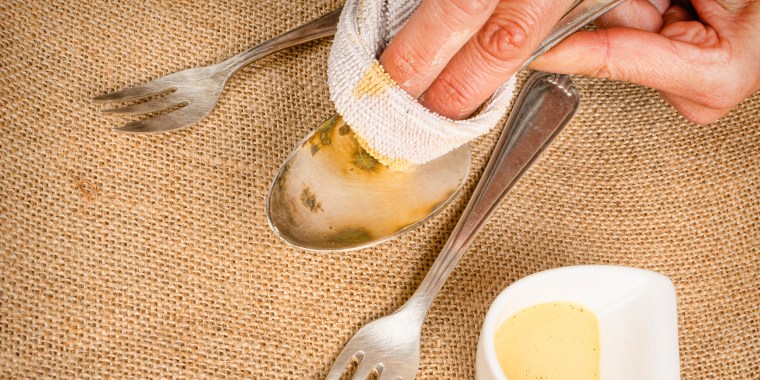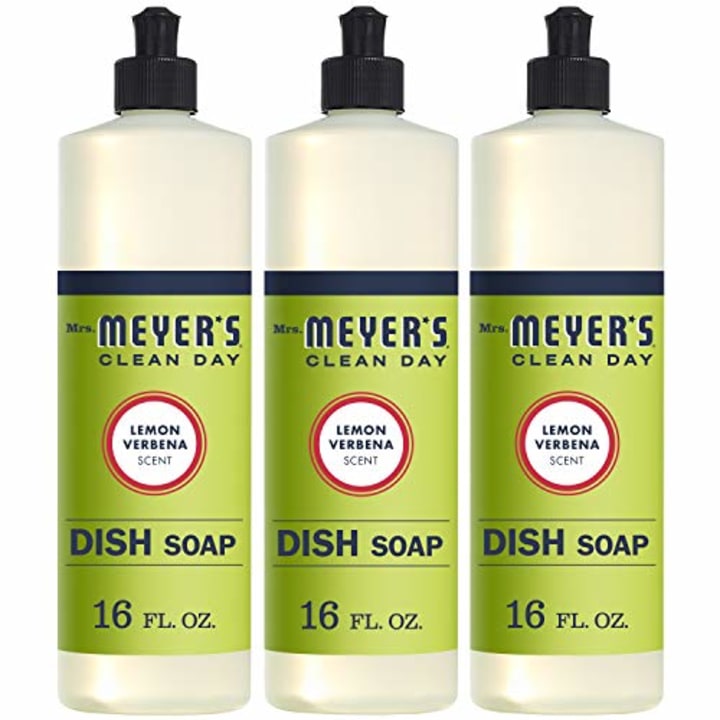Keeping silver clean can sometimes feel like an uphill battle. Whether you're dealing with basic silverware (aka flatware) or fine silver silverware (made of actual silver), cutlery regularly takes a beating and it's hard to keep it looking fresh as time goes on.
If you're sick of water spots and rust and aren't sure how to best clean your silverware, you're not alone. But you don't have to resign yourself to tarnished fine silver and spotty flatware. TODAY Home consulted the pros to get expert silverware-cleaning tips to make your life easier.
What material is my silverware made of?
First things first, it's helpful to know that silverware can be made from multiple materials, most of which aren't actually silver. And different materials require different cleaning methods.
For instance, your normal, everyday flatware is most likely made from stainless steel and isn't as delicate as fine silverware.
"There are three types of stainless steel flatware: 18/10, 18/8 and 18/0. The numbers refer to the percentages of chromium and nickel in the stainless steel alloy. The '18' refers to the chromium content, which gives flatware its rust-resistance properties, and the '8' or '10' refers to the nickel content, which gives it its silver-like shine and some rust-resistance," Brianna Clark, a Sur La Table tabletop buyer, said.
Fine silverware, on the other hand, is typically made from sterling silver, which is almost all pure silver with a bit of copper mixed in. "Copper gives the cutlery strength, as pure silver is a soft material. To be called sterling silver, the cutlery must have at least 92.5 percent pure silver," Jake Kalick, co-founder of direct-to-consumer cookware company Made In, said. Additionally, some flatware is plated with a small amount of silver, so understanding how to clean silver plate is important, too.
Even though they're made of different materials, everyday flatware and fine silverware have at least one thing in common: You shouldn't clean them with harsh brushes (they can scratch the utensils). Instead, opt for soft-cleaning cloths.
How to clean basic silverware/flatware
The best part about basic silverware (flatware) is that it's super easy to clean. That's why it's ideal for everyday use.
"Any dishwasher or dishwashing detergent can be used to clean flatware on a daily basis. Just don’t use products with bleach or abrasive ingredients," Melissa Maker, cleaning expert and host of the YouTube Channel Clean My Space, said. Doing so could damage your items.
Mrs. Meyer’s Clean Day Liquid Dish Soap, $11, Amazon
While washing basic silverware, aim for hot temperatures to help disinfect everything, always dry right away to avoid spots and don't be afraid of DIY cleaning solutions.
"If hand-washing, make sure to use non-abrasive cloths to remove any water spots. Natural cleaning solutions such as vinegar, cider, lemon juice, olive oil and soda water all work wonderfully on removing stains from stainless steel as well," Clark said.
Luckily, daily use silverware rarely needs to be polished, but once in a while, you might need to do a thorough cleaning if things are looking a little spotty. This homemade flatware cleaner from Merry Maids cleaning expert Debra Johnson will do the trick:
- Use a long rectangular pan or a large bowl that's as long as the flatware so you can lay it flat.
- Mix warm water with vinegar (1 part vinegar to 3 parts water) and let the flatware soak for up to 30 minutes.
- Dry flatware with a microfiber cloth.
If you're dealing with basic water spots, Johnson also recommends using a stainless steel cleaner to wipe down flatware before soaking in a cleaning solution for 15 to 20 minutes and drying off with a microfiber cloth. Or you can nix spots with a common kitchen ingredient: olive oil!
"Wipe stainless steel flatware with a cotton ball and olive oil. This will remove spots and return the shine to the flatware," Johnson said.
Rust spots are admittedly more annoying than water spots, but you can tackle them with a DIY cleaning solution, too.
"For rust spots, mix a solution of equal parts cream of tartar and lemon juice and gently scrub away. Rinse well and dry," Maker said.
How to clean fine silverware
Gone are the days when fine china and silverware were a nightly dinnertime routine. Now, most of us only break out real silver flatware (if we have it) for special occasions and holidays. And for good reason, too — it's pretty high maintenance.
After all, you have to hand-wash and regularly polish fine silverware silver, so it's not always practical, especially for those of us who hate doing dishes.
"Fine silverware (made of actual silver) should really never be put in the dishwasher. The harsh detergents can damage the silver and require professional cleaning," Kalick said.
While you're at it, try to avoid detergents with lemon scents and acidic products such as citrus or vinegar. They're all too harsh for sensitive silver!
If you absolutely positively can't resist putting fine silverware in the dishwasher, just make sure you don't put it in the same basket as stainless steel silverware. "The metals will react and stain your silver," Kalick said.
In general, good old fashioned soap and warm water will do the best job of cleaning real silver. Just make sure to hand dry immediately with a non-abrasive cloth to remove water spots without scratching the silver.
Before cleaning fine silverware, try to rinse and remove any food particles as soon as possible. Otherwise, it could tarnish. And when your fine silver does tarnish at some point, break out the silver polish.
"Polish it and then remove the polish quickly with hot water (fine silver loves hot water), then dry immediately to avoid water spots. Again, avoid the abrasive cloths," Kalick said.
And don't forget to store your real silver properly. Keeping it stowed away safely can actually help reduce potential tarnishes. Johnson suggests the following storage techniques:
- Store in an airtight container and add silica gel.
- Purchase tarnish-proof bags and place each piece of silverware in a separate bag.
- Purchase an anti-tarnish silver case.
Now that your silverware is clean, why not try cleaning your silver jewelry or other silver products around your house?
This article was originally published on Oct. 25, 2018.




